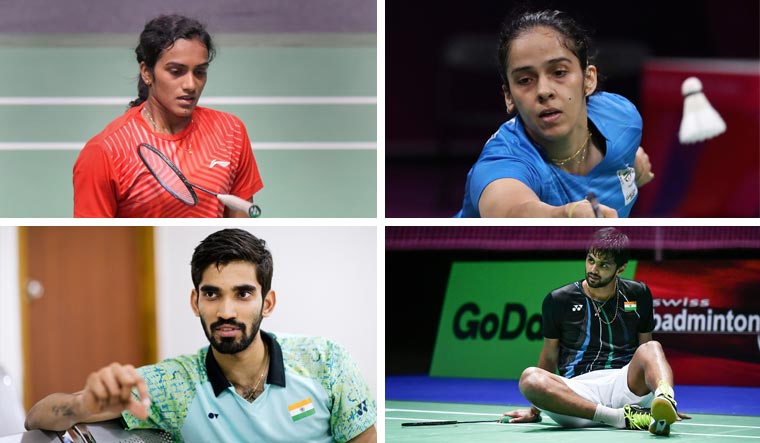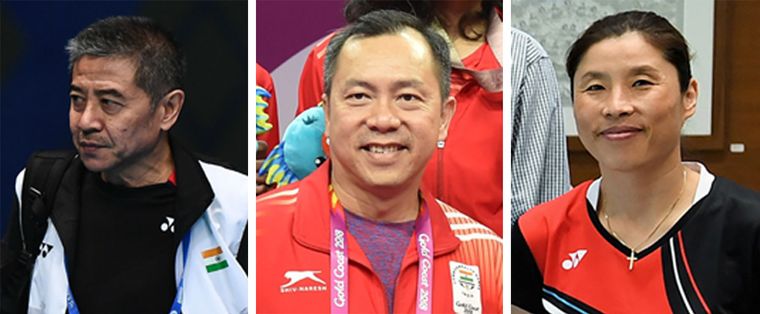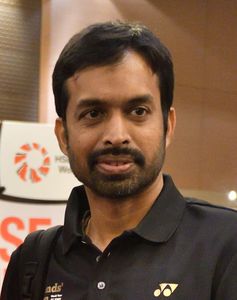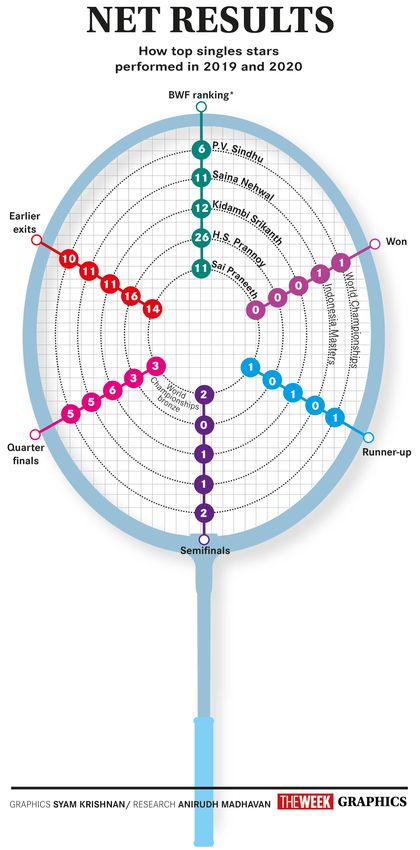When P.V. Sindhu became world champion on August 25, 2019, it was a red-letter day for both her and Indian badminton. The way she demolished Japan’s Nozomi Okuhara—21-7, 21-7—banished the demons of earlier losses at the tournament. Since that day, however, life as world champion has not been swell; a podium finish has eluded Sindhu.
Her best since then has been quarterfinal finishes at the French Open in October and the Malaysia Masters in January. It is not easy being an Olympic silver medallist and a world champion; fans expect her to win each time. However, as a known performer in top tournaments, most people feel it is only a matter of time before Sindhu returns to the podium.
The same cannot be said for the best male player in India right now; Kidambi Srikanth has had a forgettable year. The former world No 1 started the year ranked eighth in the BWF rankings. He ended the year at No 12. It was not a massive drop, but his early exits in Badminton World Federation events were alarming. His best appearance in 2019 was the final of the Yonex-Sunrise Indian Open, which he lost to Denmark’s Viktor Axelsen in March.
The other top female singles player—former world No 1 Saina Nehwal—ended 2019 ranked 11. She had started 2019 by winning the Indonesian Masters in January, but had only a clutch of quarterfinal exits to show after that.
Sai Praneeth is currently India’s best-ranked male singles player, at 11. The World Championship bronze medallist, however, had only a slew of early exits to show in subsequent competitions. The next best-ranked male singles player is Parupalli Kashyap, at 23.
The world championships medals—for Sindhu and Praneeth—were the brightest spots in an otherwise dull year. There were a few others, too, like the men’s doubles team of Satwiksairaj Rankireddy and Chirag Shetty. The duo won its first major title, the Thailand Open, becoming the first Indian pair to win a Super 500 title. They also became the first Indian pair to break into the top 10 of the BWF rankings. The women’s doubles team and mixed doubles team, however, have floundered.
In the past decade, India has emerged as a force in world badminton. However, with the Tokyo Olympics beckoning, the mediocre results by top Indian male stars could hamper their chances of qualification for the event.
Another concern is the high attrition rate of foreign coaches whom the Badminton Association of India (BAI) and the Sports Authority of India had brought in to coach elite players. And going into the Olympics, the lack of personalised coaching has become a headache for the federation, the players and chief national coach Pullela Gopichand, who already has his hands full. “It (the dip in form) is a matter of concern for us, even we are looking for answers,” BAI general secretary Ajay Singhania told THE WEEK. He was also worried about the foreign coaches quitting after short stints. “We, too, want to know why this is happening,” he said. “BAI president Himanta Biswa Sarma and I are meeting Gopichand and top players to determine the reasons and problems, if any.”
While Gopichand had been allowed unfettered powers in planning, selection and coaching, the BAI has now started asking questions. The decision to have a fact-finding meeting was taken after Flandy Limpele, the foreign coach for the doubles teams, spoke about the “bad attitude” of doubles players on indosport.com, an Indonesian website. He also said, about the Indian stars in general: “I could probably feel what the previous coaches felt, because this attitude thing is so unique to India. Plus, it looks like foreign coaches ending their contracts faster is a common tradition, so it will be nothing new to me. It could be that I will also experience things like coach Kim [Ji Hyun] and Mulyo [Handoyo]; there are already signs. It is tradition, so no one wants up to four or five years.”
Three foreign coaches—Mulyo (men’s singles), Kim (women’s singles) and Tan Kim Her (doubles specialist)—left before their contracts ended. While Handoyo was credited with the success of Srikanth, Sai Praneeth and H.S. Prannoy, Kim was praised for her work with Sindhu ahead of the World Championships.
P.V. Ramana, Sindhu’s father, was upset about people questioning the attitude of players. “Although this is a question you should ask Gopi (Gopichand), where is the issue about attitude? The players who have succeeded have put in a lot of hard work and have made sacrifices,” he told THE WEEK.
Gopichand, for his part, said the unflattering run of top singles shuttlers was because of overexposure and burnout. “This year has been tough,” he told THE WEEK. “I think players have [participated in] too many tournaments although we have had some good results at the World Championships with Sai and Sindhu doing well. We have not had great results other than that. Having said that, Satwik and Chirag have done well. We went through this problem in 2015 also. We need to address this in the long term to ensure that players do not burn themselves out, especially going into qualifications for big events.”
The qualification period for the Olympics, as per the BWF, is from April 29, 2019 to April 26, 2020. The world rankings as of April 28, 2020 will be used to allocate the quota places in the five events.
Gopichand is banking on Sindhu’s ability to perform in big competitions to get desired results, particularly an Olympic medal. “Luckily, in the past eight to 10 years, we have had great success with our preparations and [she has been] peaking for big events, and that is what we are hoping for,” said Gopichand. “Women’s singles is going to be one of the most interesting ones, [with] Carolina Marin, Tai Tzu Ying, [Akane] Yamaguchi, Nozomi Okuhara and the Chinese in the mix. Interesting for both Saina and Sindhu.”
Given the paucity of time, it is unlikely that the administration would hire a top-class singles coach for personalised training. “We will have our eyes open; if we see a chance, we will try to get them in,” said Gopichand. “Park [Tae-Sang] has been super helpful and we, as a team, are working together. We will be able to get into good shape for the Olympics.”
Though the BAI and Gopichand have denied any truth in Limpele’s comments, the episode has struck a sensitive chord. There are questions on why coaches are struggling to adapt to the Indian system. For instance, though Handoyo officially left for “personal reasons”, he had reportedly asked for a freer hand. Kim’s exit was quite a shocker. She had left abruptly, saying she had to be with her ailing husband in New Zealand, but there have been recent reports of her taking on a coaching job in South Korea. The third coach, Tan, reportedly left because BAI could not meet his salary and contractual expectations.
Gopichand, however, said the matter has been blown out of proportion. “I think the only surprise was Kim,” he said. “In the long run, many coaches have stayed back. I do not think it is much of a problem. Park is very happy here. We have a good team with Flandy [Limpele] and Park.”
With fewer foreign coaches, the existing ones have to do more. Jwala Gutta, former doubles player and Gopichand’s bete noire, blamed him. “He made the system. He has been the chief coach since 2006. Whose fault is it?” she asked.
Gopichand admitted that more players playing in international events at both senior and junior levels has spread his coaching resources thin. “I have been saying we need more coaches,” he said. “To work on our own coach development programme is important. Our players have grown in number, our requirement for coaches has grown, but supply is not same as demand. There are a bunch of players in the top 50 who need personalised coaching and we are not able to provide it. There are players ranked very high in world junior rankings, [but] we do not have the coaches. Unless we look at this issue in the long term and seriously, we are not going to address it. In the long term, we might still need foreign coaches. That input from outside is important.”
For now, Limpele is on the job. Though for how long is anyone’s guess.





